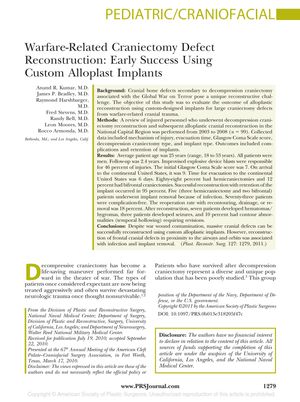Warfare-Related Craniectomy Defect Reconstruction: Early Success Using Custom Alloplastic Implants
March 2011
in “
Plastic and Reconstructive Surgery
”

TLDR Custom-designed implants effectively repaired skull damage in most soldiers injured in combat.
The study conducted between 2003 and 2008 included 99 male patients with an average age of 25 years who had sustained warfare-related cranial trauma and underwent decompression craniectomy. The majority of injuries were caused by improvised explosive device blasts. The study found that custom-designed alloplastic implants were successful in reconstructing cranial defects in 95% of cases, with a follow-up period averaging 2.4 years. Complications were observed in 27% of patients, including infections, hematomas/hygromas, seizures, and contour abnormalities. Despite these complications, the study concluded that massive cranial defects can be successfully reconstructed with custom alloplastic implants, with a recommendation for autogenous bone reconstruction in cases not suitable for alloplast, particularly near the orbits and airways. The study suggests that alloplast implants can be a viable option for cranial reconstruction in selected patients, but emphasizes the need for long-term follow-up to assess the safety and retention of the implants.